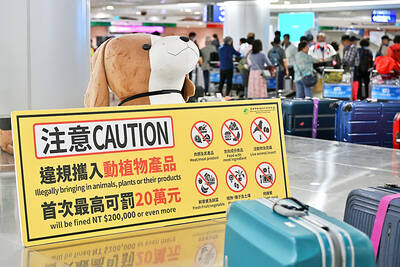Oil prices hovered above US$78 per barrel yesterday, near record highs, as intensifying violence in the Middle East raised concerns of a possible disruption of oil supply.
"We are certainly in uncharted territory," said Victor Shum, an energy analyst with Purvin & Gertz in Singapore.
"I wouldn't be surprised if US$80 is attained soon with this slew of geopolitical events in a tight market," he said.

PHOTO: AFP
Oil prices are being pushed higher by rising global demand and worries that the world's limited supply cushion would not be adequate to offset a lengthy disruption to output in major producing countries, such as Iran or Nigeria. There are also concerns about the risks hurricanes pose to US production.
"We haven't even taken into account a potential hurricane in the United States, so getting to US$80 and beyond this summer seems quite inevitable," Shum said.
"But if these Middle East events somehow get resolved, prices could also drop sharply," he said.
While Israel and Lebanon are not involved in the Middle East oil market, the fear is that the conflict could spill into other corner of the region, which produces nearly a third the world's oil and contains almost two-thirds of its untapped reserves.
Light sweet crude for delivery next month was up US$1.35 to US$78.05 a barrel in midafternoon Asian trading on the New York Mercantile Exchange. The price closed on Thursday at a new high of US$76.70 a barrel, then continued climbing in after-hours electronic trading, when volumes are significantly lower, to US$78.40.
The Brent contract for next month at London's ICE Futures exchange, which expired at the close of trading yesterday, jumped US$1.16 to US$77.85 per barrel.
The rally came as fighting between Israel and Lebanon intensified, explosions hit Nigerian oil installations and a diplomatic standoff dragged on between the West and Iran over its nuclear program.
The surge in oil prices rattled global financial markets, with Japan's Nikkei 225 index falling 1.7 percent yesterday, while the Dow Jones industrial average dropped 1.5 percent on Thursday.
The previous Nymex settlement record of US$75.19 was set on July 5. The previous intraday record of US$75.78 was posted two days later.
In other trading, gasoline futures climbed US$0.0352 to US$2.3365 a gallon, heating oil futures rose more than US$0.04 to US$2.1238 a gallon and natural gas futures advanced US$0.099 to US$6.228 per 1,000 cubic feet.
Meanwhile, Iran has threatened on more than one occasion to use oil as a weapon if the UN uses economic sanctions or some other punishment in its dispute with Tehran over its nuclear program.
While OPEC's No. 2 supplier has not raised the issue of withholding oil from the market in a sign of solidarity with Hezbollah, the possibility is no doubt influencing oil traders' actions.

UKRAINE, NVIDIA: The US leader said the subject of Russia’s war had come up ‘very strongly,’ while Jenson Huang was hoping that the conversation was good Chinese President Xi Jinping (習近平) and US President Donald Trump had differing takes following their meeting in Busan, South Korea, yesterday. Xi said that the two sides should complete follow-up work as soon as possible to deliver tangible results that would provide “peace of mind” to China, the US and the rest of the world, while Trump hailed the “great success” of the talks. The two discussed trade, including a deal to reduce tariffs slapped on China for its role in the fentanyl trade, as well as cooperation in ending the war in Ukraine, among other issues, but they did not mention

Japanese Prime Minister Sanae Takaichi yesterday lavished US President Donald Trump with praise and vows of a “golden age” of ties on his visit to Tokyo, before inking a deal with Washington aimed at securing critical minerals. Takaichi — Japan’s first female prime minister — pulled out all the stops for Trump in her opening test on the international stage and even announced that she would nominate him for a Nobel Peace Prize, the White House said. Trump has become increasingly focused on the Nobel since his return to power in January and claims to have ended several conflicts around the world,

REASSURANCE: The US said Taiwan’s interests would not be harmed during the talk and that it remains steadfast in its support for the nation, the foreign minister said US President Donald Trump on Friday said he would bring up Taiwan with Chinese President Xi Jinping (習近平) during a meeting on the sidelines of the APEC Summit in South Korea this week. “I will be talking about Taiwan [with Xi],” Trump told reporters before he departed for his trip to Asia, adding that he had “a lot of respect for Taiwan.” “We have a lot to talk about with President Xi, and he has a lot to talk about with us. I think we’ll have a good meeting,” Trump said. Taiwan has long been a contentious issue between the US and China.

Taiwan’s first African swine fever (ASF) case has been confirmed and would soon be reported to the World Organization for Animal Health (WOAH), Minister of Agriculture Chen Junne-jih (陳駿季) yesterday. The Ministry of Agriculture’s Veterinary Research Institute yesterday completed the analysis of samples collected on Tuesday from dead pigs at a hog farm in Taichung and found they were ASF-positive. Animal and Plant Health Inspection Agency Animal Quarantine Division chief Lin Nien-nung (林念農) said the result would be reported to the WOAH and Taiwan’s major trade partners would also be notified, adding that pork exports would be suspended. As of Friday, all samples